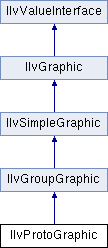| Views Prototypes Package API Reference Guide |
Views Documentation Home |
Encapsulates an IlvGroup into a regular IlvGraphic.
More...
#include <ilviews/protos/protogr.h>

Public Member Functions | |
| IlvProtoGraphic (IlvDisplay *display, const char *protoName, IlvPalette *palette=0) | |
| Initializes a new prototype graphic that encapsulates an instance of a prototype. More... | |
| IlvProtoGraphic (IlvDisplay *display, IlvGroup *group, IlBoolean owner=IlTrue) | |
| Initializes a new prototype graphic that encapsulates a group. More... | |
| IlvProtoGraphic (IlvDisplay *display, IlvPrototype *proto, IlvPalette *palette=0) | |
| Initializes a new prototype graphic that encapsulates an instance of a prototype. More... | |
| IlvProtoInstance * | getProtoGraphic () |
| Returns the prototype instance held by this object. More... | |
 Public Member Functions inherited from IlvGroupGraphic Public Member Functions inherited from IlvGroupGraphic | |
| IlvGroupGraphic (IlvDisplay *display, IlvGroup *group, IlBoolean owner=IlTrue, IlvPalette *palette=0) | |
| Initializes a new group graphic attached to a specified group. More... | |
| IlvGroup * | getGroup () const |
| Gets the group associated with this group graphic. More... | |
Friends | |
| class | IlvProtoGraphicInteractor |
Encapsulates an IlvGroup into a regular IlvGraphic.
Library: ilvproto
IlvProtoGraphic is a subclass of IlvGraphic that encapsulates an IlvGroup. IlvProtoGraphic can be added to any manager or container, like any other Rogue Wave Views graphic object.
The recommended way to use the prototypes and IlvGroup features is to place an IlvGroup into an IlvProtoGraphic and use regular managers.
All calls to the changeValue, queryValue, and getAccessors methods are propagated to the internal group, so that handling an IlvProtoGraphic works exactly the same way as handling an IlvGroup.
IlvProtoGraphic class inherits from the IlvGraphic class, the setInteractor() function must NOT be used to change the interactor on an IlvProtoGraphic object, because IlvProtoGraphic objects each have their own internal interactor.IlvProtoGraphic object cannot manage the focus correctly because it is an IlvGraphic object. Only the classes that inherit from IlvGadget class can manage the focus correctly. | IlvProtoGraphic::IlvProtoGraphic | ( | IlvDisplay * | display, |
| IlvGroup * | group, | ||
| IlBoolean | owner = IlTrue |
||
| ) |
Initializes a new prototype graphic that encapsulates a group.
| display | Display used to initialize the object. |
| group | Group to be encapsulated. |
| owner | If set to IlTrue, the group will be deleted when the object is deleted. |
| IlvProtoGraphic::IlvProtoGraphic | ( | IlvDisplay * | display, |
| IlvPrototype * | proto, | ||
| IlvPalette * | palette = 0 |
||
| ) |
Initializes a new prototype graphic that encapsulates an instance of a prototype.
| display | Display used to initialize the object. |
| proto | The prototype to be encapsulated. |
| palette | Unused parameter, left for compatibility reasons. |
| IlvProtoGraphic::IlvProtoGraphic | ( | IlvDisplay * | display, |
| const char * | protoName, | ||
| IlvPalette * | palette = 0 |
||
| ) |
Initializes a new prototype graphic that encapsulates an instance of a prototype.
The instance encapsulated by the graphic object is created by the IlvProtoGraphic constructor. The prototype instance is always owned by the IlvProtoGraphic, that is, it will be destroyed when the graphic is destroyed.
| display | Display used to initialize the object. |
| protoName | Name of the prototype to be instantiated as the encapsulated group. |
| palette | Unused parameter, left for compatibility reasons. |
| IlvProtoInstance* IlvProtoGraphic::getProtoGraphic | ( | ) |
Returns the prototype instance held by this object.
0.